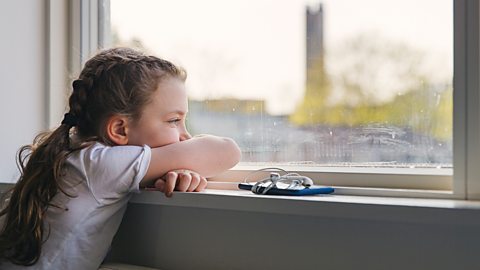Summer's nearly over and it's time to get the kids ready for school.
If your child is about to start primary school this may feel like an epic task, but worry not, BBC Bitesize and CBeebies have got your back!
CBeebies Learn App, a learning app from CBeebies and BBC Bitesize, has got a new suite of Dodge's Pup School videos - designed to help prepare your little one for everything primary school will have in store.
You can see some of what CBeebies Learn app is offering below, as well as some advice from Early Years Educational Consultant Heather Sargeant on how these videos can help your child as they prepare for primary school.

Dodge's Pup School
Children often have a natural curiosity about school before they go, so you can use these clips from the CBeebies Learn app to gently introduce your child to school in a fun, Dodge-style way and hopefully reduce any worries that they might have.
How does making new friends contribute to your child's development?
Dodge starts school and makes new friends.
Dodge’s Pup School!
Hi everyone, it’s me Dodge! Are you getting ready to start school? Well, guess what – I’ve just started! And I wanted to tell you all about my first day because it was AWESOME! I was a bit worried at first but me and Coogie made lots of new friends.
Oh, hi, I’m Biscuit. Are you excited for your first day at Pup School too?
Well…
First day today! Pup School! Today!
Okay, Coogie, let’s do this! Mm. Mm.
I’m a little bit excited actually!
Wow! This is brilliant. So many pups. Um. Oh, sorry. Can I just, uh.
Hello?
Whoa! Hi
What’s your name? Is it Ralph? No, uh, wait, uh, Sebastian? Is it, uh, uh, Eduardo? Eduardo! No, Harold.
I’m Woofer.
I’m Dodge.
I was just about to say that. Hi, Dodge. I’m Jazz. Are you coming to class?
Why don’t the three of us go in together?
Oh, yeah, okay!
And now we are friends. Yay! We painted things together. We ran around outside. Oh, we even sang a song about it, haha!
[SINGING]
A brand new start
A brand new day
A brand new start
A brand new day
I was standing at the gate this morning. I was wondering who I’d meet in there.
Ooh.
Noisy noises. Need a great big warning.
We’re together Puggers, don’t be scared.
Oh, I just knew I’d find this school exciting.
I just knew we’d be the best of friends.
Yeah!
We’ll be together till the school day ends.
It’s a brand new start.
It’s a brand new day.
It’s a brand new world.
It’s a brand new way.
When there’s books and art.
Where there’s friends and play.
It’s a brand new start.
It’s a brand new start today!
[END OF SONG]
And that was my first day at school. I can’t wait to see my new friends again tomorrow. If you enjoyed hearing about it, why don’t you check out the BBC Bitesize area and play the My First Day at School game in the CBeebies Learn app.
Have fun!
Dodge’s Pup School!
Children’s language develops a lot in social situations, whether with parents, caregivers, family members, key workers or other children in a nursery or pre-school setting. By around 2 years old, it's worth noting if your child is showing an interest in what other children are playing and sometimes joins in. By around 3-4 years, we’d typically expect children to start a conversation with an adult or a friend and continue it with many turns.
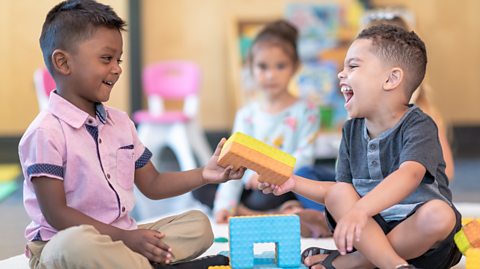
There's a typical development for social play, which starts with solitary play, moving to parallel play, where children play in the same space but will have their own focus for play, and then to cooperative play, where children are involved together in play. In an Early Years setting, you'll most often find a mixture of these types of play and children experiencing a variety of activities. Children with delayed language development can sometimes play quietly.
If you're with two children playing in parallel, you'll probably naturally ask questions and engage the children with what the other child is doing. This is a good way of extending a child’s vocabulary, by describing to them what another child is playing or doing, e.g. saying, ‘Can you see Cora’s tower? It is getting taller and taller every time she adds another brick. Would you like to build too?’ Try to add spaces as too many questions can sometimes be overwhelming.

You can also play simple turn taking games with two children and say to them when it is their turn and then their friend’s turn. There are some lovely ideas for turn taking at an early age on BBC Tiny Happy People.
If you're concerned that your child is playing in a solitary way or isn’t using social language, it's a good idea to share this with their key worker at their nursery/preschool or to talk to your health visitor.
How do books and creating stories help prepare a child for school?
Dodge and friends talk about the fun of imagining things.
Dodge’s Pup School!
This book is brilliant! Oh, do you like books? We read them at school during story time, and I like to sit and look at them with my friend, Woofer. My favourite story is the one about the giraffe who is so tall she can see above rainbows. The best thing about books is they help you to imagine what stories you could make up. Let’s try now!
Hmm!
Imagine if you went fishing but didn’t know that a whale was swimming around, popped up under your boat! Yeah! How good would that be?
Or, imagine if you were the kind or queen of a biscuit factory. Loads of people turned up to the opening of a hugely delicious biscuit factory. And your biscuits were famous all over the world! Hahaha! What a great story that would be! Oh, and they are just starting points. You’ll need to think of a start, a middle and an end. Why don’t you try making up a story of your very own? I think they’ll be amazing!
And when you go to school, why don’t you sit with your bestie and find your favourite book to share!
I can’t wait to read every book in the school!
I love gardening!
Whopper idea Bertie! We could grow tomatoes!
Yeah!
Cucumbers!
Yep!
Carrots!
Oh yes!
Sandwiches! Oh yeah!
I don’t think you can grow sandwiches, Biscuit. But I will look it up in my gardening book. Yeah, let’s have a look. Sandwiches…
Anything?
No, no.
Did you enjoy that video? Hey! Me too! There are loads more videos to enjoy in the CBeebies Learn app, as well as fun learning games with your CBeebies favourites. Oh, also, don’t forget to check out the BBC Bitesize area for more fun videos to get you ready for school! See you soon! Bye!
Dodge’s Pup School!
Storytelling is something that develops hugely within the Early Years. It’s linked to play, role play and small world play. It’s not unusual to hear children narrating their play in the Early Years with toys or giving toys a voice and this is a type of storytelling. When children hear and learn stories from books – and these are often the ones they love to hear time after time – they then start to recall those stories and understand the general structure of the story too i.e. a beginning, middle and end.
Reading with children helps strengthen the attachment between children and their parents as well as introducing them to a whole world of vocabulary. It also helps children to improve their attention.
It's helpful to know that these initial storytelling skills makes a huge difference to the later skills (literacy and other academic skills) that children learn at school. So not only is it positive for your child to play and enjoy stories in their Early Years, it will also benefit them as they continue to learn.
How can you encourage curiosity in your child?
Dodge’s Pup School!
Hi, it’s me, Dodge. Are you getting ready to join school? Oh, my dad at school was… hmm… okay… Ha! Not really! It was amazing! Yay! We’re finding out about new things every day. Oh, and my teacher, Miss Collie, brought in a stick insect for us to look at. Me and my friends loved it.
Oh!
Huh? What’s a stick insect?
Why don’t you come over and see?
Oh, well, umm…
Well, where is it?
Yeah, I can only see a load of twigs.
Stick insects can be tricky to see because they look like… sticks! You just need to take a closer look.
Oh yeah, I see it! There it is, look! Ohhhh, he’s cute.
Oh, yeah.
We couldn’t see the stick insect at first because it looked exactly like a stick! But when we looked really carefully, there it was. It was amazing. Oh, and then we had a go at guessing the stick insects name.
Now, can you guess what my stick insects name is?
Norman Wilkins!?
Sticky?
Norman Wilkins!
Insect-y?
NORMAN WILKINS!!
No no no, my pet insect’s name is… Woody!
Aww! That’s lovely! Hello Woody!
Dawh, we loved meeting Woody today at school. I wonder what wonderful new things you’ll see in your classroom when you go to school. Maybe you could go with a grown up and look for insects in your local park and name some of them. Oh, remember, be gentle, though. Insects are very tiny and they need to stay where they live. Maybe you can count their legs or see if they have wings. Oh, fun!
Dodge’s Pup School!
Albert Einstein is famously quoted:
“I am neither clever nor especially gifted, I am only very, very curious”.
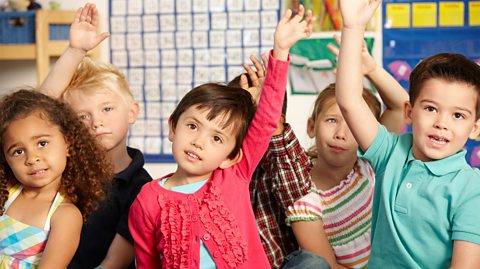
Small children are very curious and this helps their learning hugely – it’s a great learning behaviour. Curiosity and pretend play can help children think beyond the here and now, allowing them to better understand other perspectives.
Children are less likely to be curious if they feel fear, disapproval or absence of a care giver so it's important that children feel secure in their setting and at home so that their curiosity can flourish. There's definitely a ‘why’ stage where it feels like that's the most frequently used word you hear from your child! It's good to remain calm when your child asks you ‘why’ and don’t forget that you can always respond to them by reflecting that ‘why’ question back at them in a positive way e.g. saying ‘that’s a really interesting question! Why do you think….?’ Or ‘have you got any ideas about why that is?’

As a parent/caregiver, you can say ‘out loud’ your own questions about different things and this will help your child to hear your curiosity. You can use phrases like ‘I wonder what this is used for’ or ‘I wonder how old this is’, or a question like ‘do you know how tall that building is?’ Don’t be put off by not knowing the answers and you may be surprised by your child’s ideas and explanations.
You can also respond to the things your child is fascinated about by sharing books on these things or planning a visit that will include these ideas. A friend of mine used to take their child on very short train trips when their preschool child was enthusiastic about trains – obviously, this depends on having a station and a short journey nearby that isn’t too expensive (and time too) but it offers lots of opportunity to talk about their interest and ask questions as you go. New experiences and places are brilliant for curiosity.

JoJo & Gran Gran
JoJo & Gran Gran: A Day with JoJo is aimed at 3 to 4 year olds and targets the Wellbeing and Independence themes of the Early Years Foundation Stage for preschool children with a specific focus on behaviours and concepts that promote school readiness.
The game is now available in the CBeebies Learn app.
How can parents talk to their children about routines?
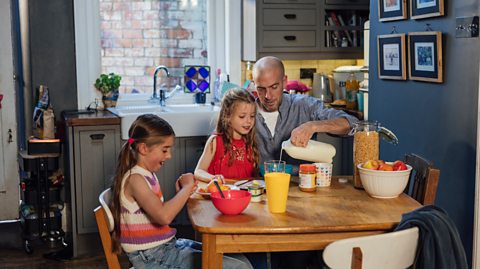
The new JoJo & Gran Gran game in the CBeebies Learn App provides lots of opportunities to explore day to day activities and routines with your child. Each ‘day’ in the game provides activities that are part of children’s self-care and daily routines like having breakfast and choosing an outfit linked to the weather. There are also several different activities (for different ‘days’) that JoJo is involved with in the app – each activity is linked with Early Years learning in some way whether that's being curious about a new activity and keeping trying to play instruments in a team, or whether that's being creative and decorating a snowman with JoJo’s friend, Lexi.
The day ends with collecting a memory from the day and adding it to a scrapbook in the app. There's a lot of opportunity to talk throughout the game about JoJo’s choices and activities and what you and your child would choose e.g., by saying ‘What’s your favourite jumper to wear when it is cold?’ or ‘What's your favourite breakfast?’


If you want to see more videos from the Dodge's Pup School series or play JoJo & Gran Gran: A Day in the Life, check out the CBeebies Learn app!

More from BBC Bitesize Parents' Toolkit
Parents' Toolkit
Fun activities, real-life stories, wellbeing support and loads of helpful advice - we're here for you and your child.
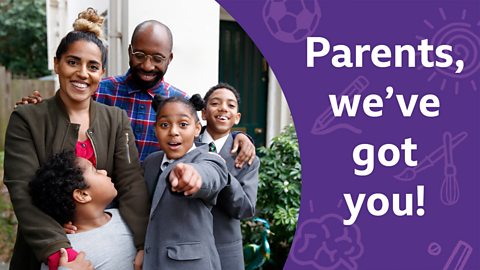
Top tips for toilet training
Early years consultant Helen Stroudley gives some top tips for getting your child toilet trained before starting primary school.
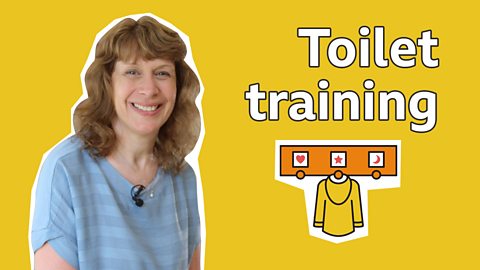
Starting Primary School
Advice and games to help you and your child prepare for primary school, then thrive during their first year.
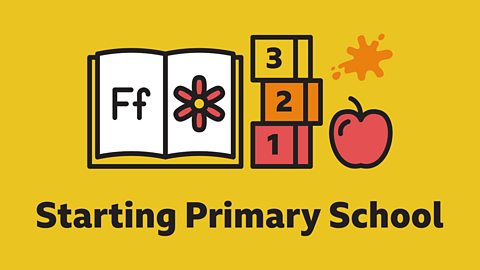
Time for School: Primary school children show us what their day looks like
Is your child starting primary school for the first time? Here's what their day will be like!
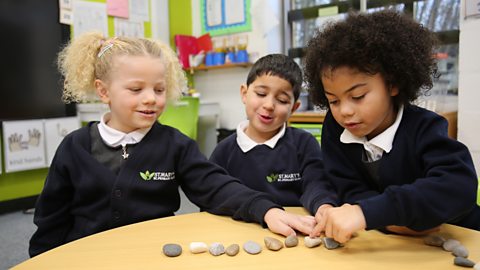
How the CBeebies Learn app makes screen time a good time for your child
The CBeebies Learn app is a great way for younger children to access safe, curated content from the BBC with no adverts and no in-app purchases.
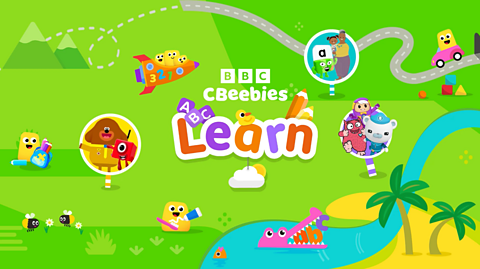
Four back-to-school worries and how to ease them
Many children will have anxieties about returning to school - here are some expert methods you, as a parent, can use to ease them.
